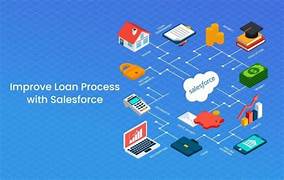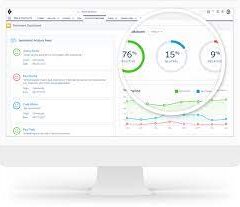Public Loan Management Solutions: Optimized with Salesforce Technology
In the dynamic world of financial services, public loan management has become increasingly important as organizations aim to improve efficiency, transparency, and borrower satisfaction. Leveraging cutting-edge technology is key to achieving these goals, and Salesforce offers a powerful platform for optimizing public loan management. This article explores how Salesforce’s capabilities can streamline and enhance various aspects of public loan management.
The Role of Loan Boarding in Public Loan Management
Loan boarding is a critical step where approved loans are entered into the system. This process typically includes data entry, document verification, and compliance checks. Salesforce’s customizable objects and automation features simplify this process by automating workflows, ensuring all necessary documents are collected and verified before the loan is boarded. Integrating external systems allows real-time data updates, minimizing errors and reducing manual intervention.
Streamlining Handoff and Approval Processes
Loan applications often require multiple approvals from stakeholders, which can be time-consuming and prone to delays. Salesforce facilitates efficient communication and collaboration through tools like Chatter, which allows instant messaging and file sharing. This ensures all stakeholders stay informed about application status changes, eliminating the need to switch between different platforms and speeding up the approval process.
Disbursement Efficiency
Timely fund disbursement is vital for maintaining borrower trust. Salesforce can automate disbursement processes by integrating payment gateways, accelerating fund transfers while providing borrowers with real-time updates on their disbursements. This enhances transparency and improves borrower satisfaction.
Effective Management of Amortization Schedules
Amortization schedules detail the repayment of loans over time, including both principal and interest. Salesforce’s reporting tools, combined with custom formulas, enable organizations to generate accurate, customized amortization schedules. These schedules can be easily updated if loan terms change, ensuring borrowers and lenders have up-to-date information.
Simplifying Repayment Schedules
Repayment schedules are essential for managing loan payments. Salesforce’s task management features allow organizations to automate reminders for upcoming payments, while borrowers can access personalized portals to view their schedules, promoting transparency and accountability.
Customizable Loan Templates
In public lending, creating flexible yet standardized loan templates is essential. Salesforce allows organizations to design customizable templates that meet both organizational policies and borrower needs, reducing onboarding time and improving efficiency.
Comprehensive Document Management
Managing loan-related documents is often challenging due to regulatory requirements and varying documentation needs. Salesforce’s integrated document management tools, such as Files and Content Libraries, provide secure storage and easy retrieval of documents, ensuring compliance and simplifying audits.
Automating Interest Accruals and Invoicing
Interest accruals require accurate tracking to ensure transparency for both lenders and borrowers. Salesforce’s invoicing automation ensures that billing cycles align with interest accruals, reducing administrative overhead and improving financial accuracy.
Efficient Payment Processing and Waterfall Management
Payment processing is essential for collecting repayments and adhering to waterfall structures, which determine how funds are allocated (e.g., to principal vs. interest). Salesforce integrates with NACHA/ACH for seamless payment processing and offers batch import capabilities for external payment records, improving cash flow management.
Portfolio Management and Risk Assessment
Managing a large portfolio of loans involves monitoring performance and assessing risks. Salesforce’s real-time analytics, reports, and dashboards provide managers with insights into portfolio performance, enabling data-driven decisions regarding portfolio adjustments, repayment patterns, and borrower risk.
Enhancing Borrower Communication
Consistent, clear communication is vital throughout the loan lifecycle, from initial inquiry to final repayment. Salesforce automates alerts and task assignments to ensure no critical communications are missed, keeping borrowers engaged and informed at every stage.
Conclusion
Salesforce technology offers a transformative approach to public loan management by enhancing operational efficiency, improving borrower experiences, and streamlining processes. Whether through automating document management, optimizing approval workflows, or managing payment cycles, Salesforce provides public lending organizations with the tools they need to deliver reliable, transparent, and efficient loan services to their constituents.
By adopting Salesforce for public loan management, organizations not only improve internal operations but also elevate the borrower experience, ultimately contributing to community development and financial inclusion on a national scale.










